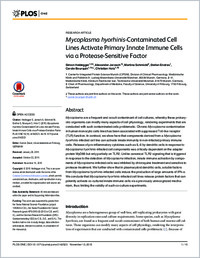Mycoplasma hyorhinis-contaminated cell lines activate primary innate immune cells via a protease-sensitive factor
- Heidegger, Simon Center for Integrated Protein Science Munich (CIPSM), Division of Clinical Pharmacology, Medizinische Klinik und Poliklinik IV, Ludwig-Maximilians-Universität München, Germany
- Jarosch, Alexander Center for Integrated Protein Science Munich (CIPSM), Division of Clinical Pharmacology, Medizinische Klinik und Poliklinik IV, Ludwig-Maximilians-Universität München, Germany
- Schmickl, Martina III.Medizinische Klinik, Klinikum Rechts der Isar, Technische Universität München, Germany,
- Endres, Stefan Center for Integrated Protein Science Munich (CIPSM), Division of Clinical Pharmacology, Medizinische Klinik und Poliklinik IV, Ludwig-Maximilians-Universität München, Germany
- Bourquin, Carole Center for Integrated Protein Science Munich (CIPSM), Division of Clinical Pharmacology, Medizinische Klinik und Poliklinik IV, Ludwig-Maximilians-Universität München, Germany - Chair of Pharmacology, Department of Medicine, Faculty of Science, University of Fribourg, Switzerland
- Hotz, Christian Center for Integrated Protein Science Munich (CIPSM), Division of Clinical Pharmacology, Medizinische Klinik und Poliklinik IV, Ludwig-Maximilians-Universität München, Germany - Chair of Pharmacology, Department of Medicine, Faculty of Science, University of Fribourg, Switzerland
-
13.11.2015
Published in:
- PLoS ONE. - 2015, vol. 10, no. 11, p. e0142523
English
Mycoplasma are a frequent and occult contaminant of cell cultures, whereby these prokaryotic organisms can modify many aspects of cell physiology, rendering experiments that are conducted with such contaminated cells problematic. Chronic Mycoplasma contamination in human monocytic cells lines has been associated with suppressed Toll-like receptor (TLR) function. In contrast, we show here that components derived from a Mycoplasma hyorhinis-infected cell line can activate innate immunity in non-infected primary immune cells. Release of pro-inflammatory cytokines such as IL-6 by dendritic cells in response to Mycoplasma hyorhinis-infected cell components was critically dependent on the adapter protein MyD88 but only partially on TLR2. Unlike canonical TLR2 signaling that is triggered in response to the detection of Mycoplasma infection, innate immune activation by components of Mycoplasma-infected cells was inhibited by chloroquine treatment and sensitive to protease treatment. We further show that in plasmacytoid dendritic cells, soluble factors from Mycoplasma hyorhinis-infected cells induce the production of large amounts of IFN-α. We conclude that Mycoplasma hyorhinis-infected cell lines release protein factors that can potently activate co-cultured innate immune cells via a previously unrecognized mechanism, thus limiting the validity of such co-culture experiments.
- Faculty
- Faculté des sciences et de médecine
- Department
- Département de Médecine
- Language
-
- English
- Classification
- Biological sciences
- License
- License undefined
- Identifiers
-
- RERO DOC 257987
- DOI 10.1371/journal.pone.0142523
- Persistent URL
- https://folia.unifr.ch/unifr/documents/304683
Statistics
Document views: 43
File downloads:
- bou_mhc.pdf: 97
